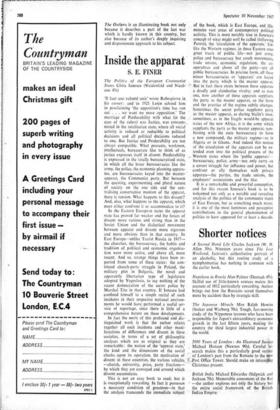The Politics of the European Communist
Inside the apparat
S. E. FINER
faut une volontd unie' wrote Robespierre in his camel: and in 1921 Lenin echoed him in proclaiming 'the opposition's time has run out . . . we want no more opposition.' The marriage of Perdurability with what (in the eyes of the rulers) was Justice, was consum-, mated in the totalitarian state, where all social activity is reduced or reducible to political decisions and all political decisions reduced to one. But Justice and Perdurability are not always compatible. What peasants, workmen, intellectuals, bureaucrats like to think of as justice expresses itself in dissent. Perdurability is expressed in the totally bureaucratised state, in which all the lesser bureaucracies like the army, the police, the economic planning appara- tus, are bureaucracies keyed into the master- apparat, the Communist party. But between the questing, experimenting and plural nature of society on the one side and the cen- tralising conservative monism of the apparat, there is tension. What happens to this dissent? And, also, what happens to the apparat, which must either confront it or accommodate to it?
In the Eastern European states the apparat state has proved far weaker and the forces of dissent more various and strong than in the Soviet Union and the dialectical movement between apparat and dissent more vigorous and more obvious than in that country. In East Europe—unlike Tsarist Russia in 1917— the churches, the bureaucracy, the habits and tradition of political and economic organisa- tion were more active, and above all, more recent. And so, strange things have been re- ported from some of these states: the con- tinued church-party struggle in Poland, the military plot in Bulgaria, the novel and apparently libertarian type of legislature adopted by Yugoslavia, to say nothing of the recent denunciation of the secret police by Marshal Tito in that country. If Ionescu had confined himself to a simple recital of such incidents in their respective national environ- ments he would have performed a useful ser- vice of reportage, since there is little of a comprehensive nature on these developments.
In fact the merit of this profound and dis- tinguished work is that the author relates together all such incidents and other mani- festations of differences and dissent in these societies, in terms of a set of philosophic analyses which are as original as they are remarkable: the notion of the 'apparat state,' the kind and the dimensions of the social checks _upon its operation, the motivation of dissent in these countries, the various vehicles —church, university, press, party fractions— by which they are conveyed and around which dissent accumulates.
This is not an easy book to read; but it is exceptionally rewarding. In fact it possesses a necessary condition of greatness—in that the analysis transcends the immediate subject of the book, which is East Europe, and illu- minates vast areas of contemporary political activity. This is most notably true in Ionescu's concept of what might well be called (following Pareto), the 'circulation of the apparats.' Un- like the Western regimes, in these Eastern ones great tracts of public life—not just army, police and bureaucracy but youth movements, trade unions, economic regulation, the co- operatives and above all the party—are all public bureaucracies. In pristine form, all these minor bureaucracies or 'apparats' are keyed into the party which is the master apparat. But in fact there exists between these apparats a deadly and clandestine rivalry; and as now one, now another of these apparats supplants the party as the master apparat, so the form and the practice of the regime subtly changes. Sometimes the secret police supplants party as the master apparat, as during Stalin's time; sometimes, as in the fragile would-be apparat states of the new Africa, it is the army which supplants the party as the master apparat, sym- biosing with the state bureaucracy to form a new compound, the military regime—as in Algeria or in Ghana. And indeed this notion of the circulation of the apparats can be ex- tended even into the political process of the Western states where the 'public apparats'— bureaucraey, police, army—not only carry on a covert struggle for influence and power, but confront or ally themselves with private apparats—the parties, the trade unions, the employers' associations and the like.
It is a remarkable and powerful conception, and for this reason Ionescu's hook is to be welcomed not only as a notable and revealing analysis of the politics of the communist states of East Europe, but as something much more; it is one of the most luminous and perceptive contributions to the general phenomenon of politics to have appeared for at least a decade.






































 Previous page
Previous page